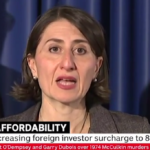Political climate change
Will Malcolm Turnbull have the political courage and skill to break our bond with carbon? Max Thomas on climate change, economics and old jokes.
According to an old joke, we would be no worse off if economists predicted the weather and meteorologists predicted the economy. Weather forecasting has vastly improved in recent decades but the political climate remains more problematic.
Economist Ross Garnaut says about climate change: “The costs of effective action come now and the benefits much later. Avoidance of dangerous outcomes requires parallel action in all of the larger countries. And effective action is politically difficult because it confronts the interests of large corporations that are accustomed to investing heavily to bend policy to their own ends.”
In September 2010, the (now) PM, the Hon. Malcolm Turnbull, said: “All of us are here accountable not just to our constituents but to the generations that will come after them and after us. It is our job, as members of parliament, to legislate with an eye to the long term future, to look over the horizon beyond the next election.” Mr Turnbull also said that Labor’s proposed scheme very closely resembled the outlines of the Howard Government’s original 2007 proposal.
This suggests that there is broad bi-partisan consensus among political leaders that climate change is a threat and that there is a need for an equitable, market-based price signal to reduce the economic distortions caused by externalising the costs of modern living to the environment.
Another old joke says that an economist is someone who wonders if something that works well in practice would work just as well in theory. Unkind? Perhaps, but market-based mechanisms elsewhere demonstrate that abatement schemes have failed to provide sufficient incentive to overcome the inertia of the carbon economy. The result has been dirt-cheap carbon credit prices with little atmospheric carbon abatement. ‘Direct Action’ as it applies to carbon in soils in Australia also provides no incentive and without long-term commitment to land management may actually cause carbon emissions to increase.
What about the tyranny of small decisions made by consumers? More than a million solar panels have been installed in Australia, about 70% of these imported from China. Ideologically and in theory this must surely be a good thing. However, the manufacture of solar panels in China is notoriously energy-inefficient. Water, soil and air pollution are also serious problems.
The point is that we must be willing to pay the true cost of goods, including solar panels and the like. Cheap goods are cheap because Chinese workers (in this case) are exploited and because pollution control is absent or ineffective. In other words, the difference between the price we pay and the true cost of goods is externalised onto workers and the environment. The harsh financial reality is that if I choose to pay the right price, I will be disadvantaged. ‘The Tragedy of the Commons’ describes the dilemma of many individuals acting rationally and separately in their own self-interest, knowing that a shared and limited resource, such as the atmosphere, will ultimately be depleted or altered against the best interests of all.
Malcolm Turnbull enjoys considerable popularity at present, but with an election looming and a lot of internal fence-mending to do, it seems unrealistic to expect he will expend much political capital on climate change in the short term.
My question is: does he have the political courage and skill to seek and obtain a mandate to break not just our economic dependence, but what has almost become an ‘organic’ bond with carbon?

Max Thomas, Dip. Agric. (retired) worked in the public sector and in private consulting on a range of land, water and waste management projects. He prepared guidelines for irrigation with recycled water for EPA Victoria and developed a number of Environmental Management Systems in the water industry.












Petra Liverani
November 18, 2015 at 6:06 am
Real cost of Chinese solar panels.
Interesting point about the real cost of Chinese solar panels – which I guess applies equally to our coal and gas. When they talk of levelised cost (net cost to install a renewable energy system divided by its expected life-time energy output) of fossil fuels against the levelised cost of renewables it's laughable because the fossil fuel externalities: air, land and water pollution, health, not to mention CO2 are not accounted for.
Max Thomas
December 18, 2015 at 11:31 pm
Externalities
Thanks for your comment, Petra. It would fit nicely within the original blog. It's too cynical perhaps, but I can't help wondering if new technology such as thin film photo-voltaic coatings and building materials etc, are being and will be suppressed by makers of 'redundant' and polluting systems that waste energy and other resources. Governments propped up the car industry for decades while that industry resisted change in the name of irrational economic theory.